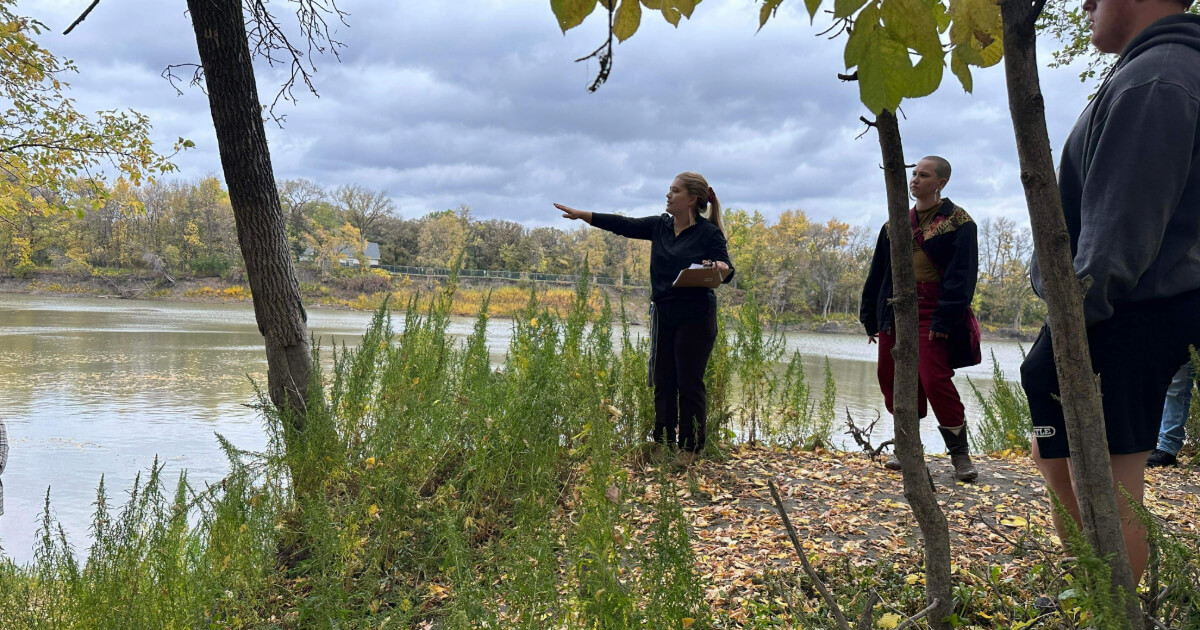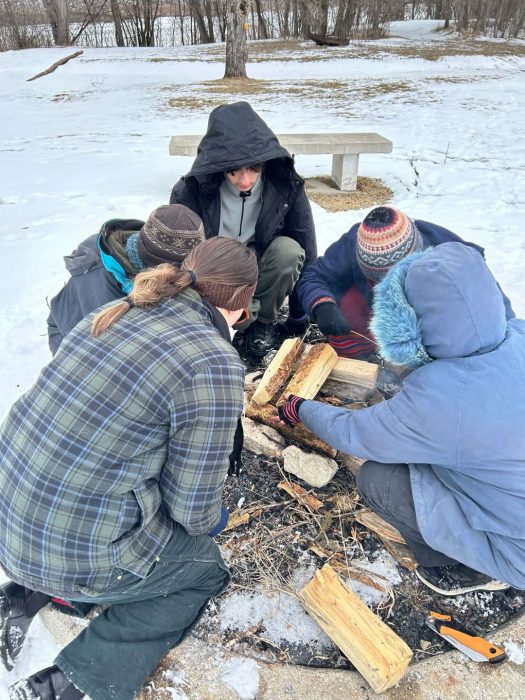
UM Land and Water program, 2024.
Learning about land and place
A glimpse into UM’s Land and Water program in celebration of Earth Day
Over the course of five days, Meghan Young engaged in deep conversations about Indigenous Peoples’ interconnected relationships with land, fish and family.
Young recently facilitated a fish skin-tanning workshop, wherein participants embarked on a multi-day process of working with the skin to eventually turn it into fish leather.
“Students descaled the fish skin, prepared tanning solutions and took them home to change solutions over the course of five days. When students brought their fish skins back, we discussed how their relationship with the fish changed—there were some really interesting conversations that came out of it,” she says.
That experience was made possible because of Young’s involvement with the Land and Water program at the University of Manitoba, both in her role as the program coordinator and as a current Métis graduate student studying Métis fishing methodologies.
Offered by Community Engaged Learning, the program brings together students, community members, knowledge carriers and Elders for immersive urban land-based experiences like the fish-tanning workshop. Using a decolonizing approach to education, it provides the opportunity for participants to learn about Indigenous Peoples’ enduring relationships with land and place.
 While workshops vary from year to year, past activities have included guided medicine walks through urban forests, building a sweat lodge, beading and rattle-making. The 2023-2024 cohort is exploring Indigenous land-based knowledge systems from a seasonal lens. “In terms of the outcomes we consider when planning the program, we focus on learning on, from and about the land,” says Young.
While workshops vary from year to year, past activities have included guided medicine walks through urban forests, building a sweat lodge, beading and rattle-making. The 2023-2024 cohort is exploring Indigenous land-based knowledge systems from a seasonal lens. “In terms of the outcomes we consider when planning the program, we focus on learning on, from and about the land,” says Young.
Though most of the Land and Water program is geared toward Indigenous UM students, other members of the UM Indigenous community and broader Indigenous communities are welcome to attend open events like their walk-and-talk series around the Fort Garry campus.
“Part of what we’re doing is helping students develop a critical lens around land and place, and teaching them to be self-reflexive about their relationships with land, place and Indigenous knowledges,” says Nicki Ferland, a Two-Spirit Métis land-based educator with Community Engaged Learning. “By hosting these activities on campus and in the city, we’re challenging those narratives on what is authentically Indigenous—this is all Indigenous land, and we can all learn from and about the plants and animals in the city.”
“It’s been super impactful for me as a student and my own identity, in beginning to see urban land as Indigenous land and my ancestral connections to this place that have spanned generations,” adds Young. “I’d really love for participants to see and build relationships with the city. There is lots of rich history, like the intersection of the Red River and Assiniboine River as a meeting place.”
The program not only considers what students need to learn, but also the community’s needs on a larger scale. Beyond gaining knowledge and practical skills, participants grow connections and learn how to learn on the land together, often in new experiential ways.
“We’re building strong relationships with each other as well as with the land and our ancestors,” says Young. “It’s great to see that relationship-building between students, Elders and knowledge carriers, and community. We’re starting to see relationships form and exist in community instead of only the university setting.”
“It’s important that students have the opportunity to learn on the land, and we want to meet students’ own needs and interest in land-based education,” adds Ferland. “It’s a great entry-level program for students who want to learn more about their cultural identities and Indigenous knowledges.”
Visit the Community Engaged Learning webpage for more information about the Land and Water program.






